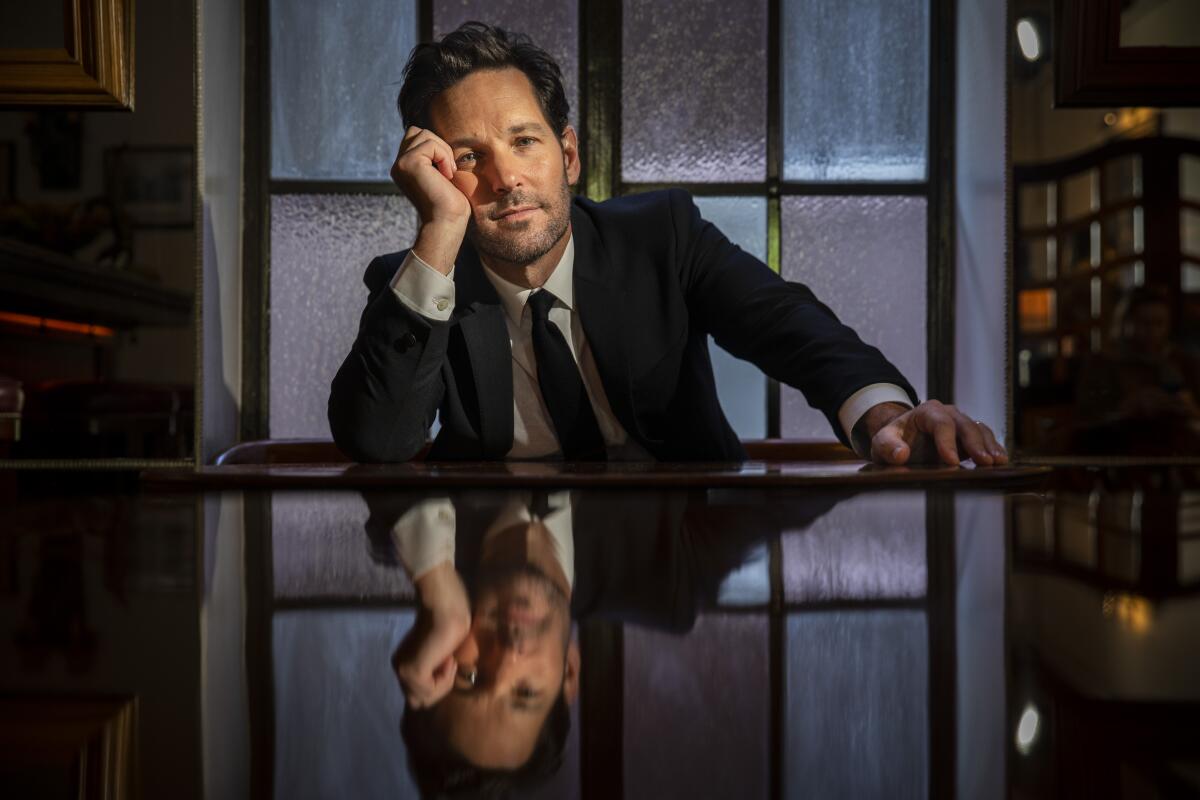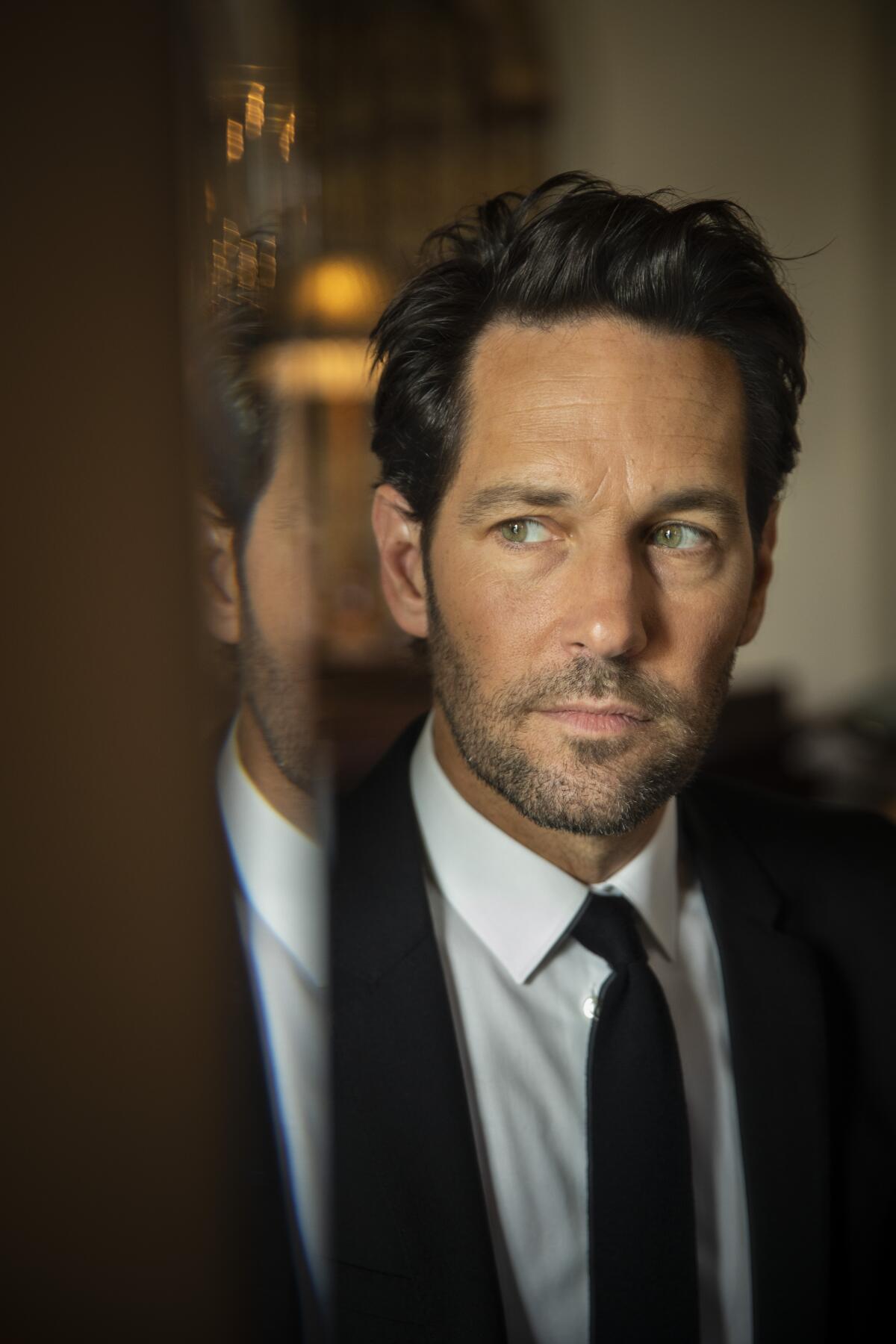Emails! Goal-setting! To-do lists! Paul Rudd is as overwhelmed as the rest of us

- Share via
There’s a moment in the first episode of Netflix’s mid-life crisis comedy “Living with Yourself” in which dissatisfied marketing executive Miles Elliot (Paul Rudd) hangs barside at a TGI Fridays, where most of life’s existential questions unravel. Miles is trying to understand how his co-worker, once grumbling, is suddenly so capable that a work presentation has earned him a cocktail shrimp tower at the chain restaurant.
“You really want to know my secret?” the colleague (Desmin Borges) says. “I went to a spa ... Ever since then, I am on fire.”
What happens next sets the show, now streaming, in motion. (Warning: spoilers ahead.) Miles undergoes the same “spa treatment” at a hefty $50,000 fee. But he doesn’t receive a massage or a facial. Instead, he receives a rejuvenated clone of himself, with a new verve for life. Under normal circumstances, the original is discarded, but thanks to a glitch, dejected Miles must coexist with his refreshed alter-ego — initiating a battle of identity with his clone, and himself, with serious ripple effects.
Created by Timothy Greenberg (“The Detour,” “The Daily Show”), “Living with Yourself” explores whether the “best” version of a person actually exists and, in turn, whether that interior makeover can be achieved authentically. Which makes Rudd’s casting a clever choice. The 50-year-old actor, in all his charming and ageless wonder, has had a fertile career — particularly in recent years, with roles in the blockbuster “Avengers: Endgame” and the upcoming addition to the “Ghostbusters” franchise — so you’d be forgiven for believing he’s already living the best version of himself. But even Rudd is well acquainted with those crippling moments where it feels like he’s sleepwalking through life.
“It’s impossible to go through [life] without getting knocked down several rungs,” he says. “I have those feelings pretty often. And I’ve been feeling them lately. Even in promoting this show, I’ll be in the middle of an interview or even in a scene from the show where I’m working a line and then I’m like, ‘What am I doing? Where the hell am I?’ ”
“I think life can be full of pressures and overwhelming,” he continues, “and sometimes, I find that I just need to detach. And sometimes I detach too much, maybe at the wrong time, where I am completely in my own head. And it’s different from when you’re just zoning out. I think it’s energy preservation, sometimes. Or it’s keeping your sanity.”
It’s a balmy Thursday afternoon, and Rudd is in the midst of his press blitz for “Living with Yourself,” having flown in from New York, where he lives with his wife and two kids, to attend the show’s L.A. premiere. Wearing a black T-shirt with comedian Bill Hicks’ silhouette and his hair slightly disheveled, Rudd is dining al fresco at a back table at Hollywood’s celebrity sanctum, the Chateau Marmont hotel. It quickly becomes an “only in L.A.” event: He exchanges pleasantries with former “American Idol” judge Randy Jackson, seated at a neighboring table, and, later, introduces himself to “Rocketman” star Taron Egerton so he can sing his praises.
Would Rudd, who is upbeat enough on this day to comment on the beauty of a glass of Arnold Palmer, ever consider handing over $50,000 to clone himself? “I can barely muster energy to go and get a haircut,” he deadpans.
The series’ premise stems from creator Greenberg’s own frustrations: “Once I got married and had kids, suddenly all the stakes got raised because now how you’re behaving affects the people in life that you love the most. And so, when you are less than your best self, why is that?” Greenberg says Rudd was able to mine that dilemma, while also playing two versions of the same character, because he’s able to toe the line between drama and comedy.

“I think most people associate Rudd with new Miles in the show — the more upside, positive version,” Greenberg says. “And I thought it would be interesting to see Paul play it down.”
Scenes involving both Mileses were shot minutes apart, a feat Greenberg praised because of Rudd’s ability to make the characters distinct. “It looked like he changed the shape of his face and yet, obviously, he didn’t... It sort of looked like he gained weight or did something wild. One minute he looks like a superhero, the other he looks like a normal human being ... It seemed like magic.”
Rudd hadn’t necessarily been looking to do a TV series — but that’s because, as he says, he doesn’t really differentiate between film and TV anymore. When he read all eight scripts to “Living with Yourself,” he was “sucked in immediately” — undaunted by the fact that he’d have to wear a diaper and be buried alive — by its message that flailing people can still have their wins.
“It dips into areas that are not traditional in comedy, and there’s some sci-fi in it,” he says. “It’s actually asking metaphysical or existential questions. It made me think about how different intellectual memory can be versus actual experiences. And what does it really mean to be the best version of myself? Is that a real thing? If it’s a real thing, what does that look like?”
He considers the question a moment. It leads to thoughts on how the rigors of reality can overpower intention.
“I have many ideas at different times of the year,” Rudd says. “Like, ‘Hey, you know what? I’m going to really prioritize something here, and I’m going to read a book.’ Or ‘I’m going to take my kids to school every day.’ Or ‘I’m going to make time for the gym.’ Or ‘I’m going to do seven things each week that make me happy.’ I’m not kidding. I’ll have these thoughts. It seems like, in theory, that’s going to help me live the best version of my life that I could be living ... It never happens.”
A beat.
“Do you have to-do lists and do you do them all?” he asks. “I do a lot. But I also, oftentimes, don’t do what’s on the list. I’ll do a few. I’ll check them off and then sometimes be like, ‘Oh, it’s been three years. I’m never doing that. Let me go ahead and take it off the list now.’
“Here’s another thing of mine that gets to be totally overwhelming, and I’m impressed with people that can manage it, and that’s email,” he continues. “I’ve gotten to the point where it’s such a tidal wave, it’s such a mega tsunami of mail, that I almost don’t even answer. There are many people in my life who need answers, and I’m sure they have stopped because I have ghosted them because I feel stuck in the mud from it all.”
When he talks about emails, Rudd sounds more like old Miles, and the rest of us: a little bit resigned to the fact that intention will never wholly defeat reality.
“I spent the flight to Los Angeles yesterday going through and deleting,” he says. “I barely even put a dent. I did it the whole flight. With emails, there’s no freedom to exist unbothered. That is essential to being a human. And when I answer them, it’s usually always starting with an apology for how long it took me to respond.”
But at least the intention was there. And really, Rudd says, that’s just as noble.
“We’re all trying, on some level.”
More to Read
The complete guide to home viewing
Get Screen Gab for everything about the TV shows and streaming movies everyone’s talking about.
You may occasionally receive promotional content from the Los Angeles Times.







